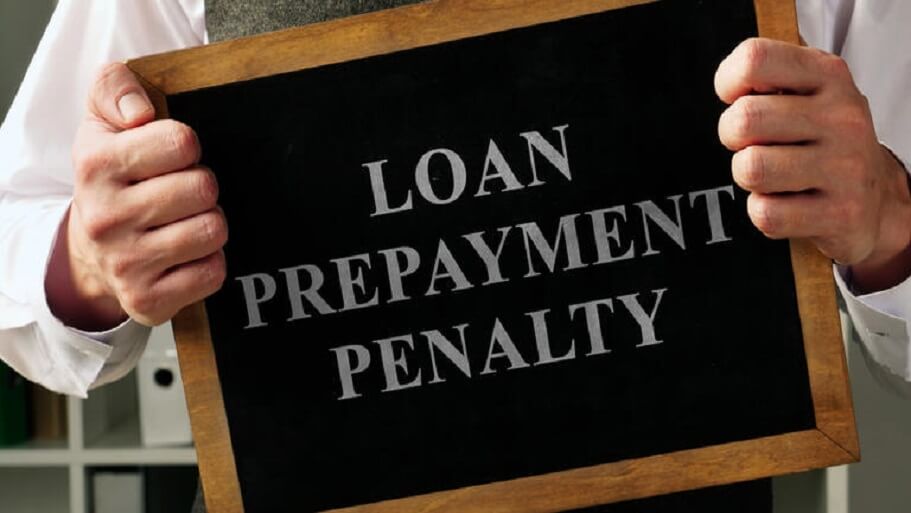If you're thinking about paying off a loan early or just want to understand more about the prepayment penalty, keep reading. This article is here to help.
We'll explain what prepayment penalties are, the different types, how they are calculated, and which loans often have them. We'll also give you tips on how to avoid these penalties and answer some common questions.
Our goal is to help you make better, informed decisions about your loans. Let's make sense of prepayment penalties together.
What Is A Prepayment Penalty?
A prepayment penalty, also known as an early payoff penalty, is a fee that a lender may charge if you pay back your loan before the end of your agreed-upon term. The penalty is a way for the lender to recoup some of the interest payments they would have received had you kept the loan for the full term.
However, prepayment penalties do not always apply to all loans, and the terms may vary widely. Some lenders might charge a prepayment only during a certain period, like the first five years of the loan, while others charge it from the beginning, but the fee decreases over time.
Therefore, it is recommended to double-check the specific loan agreement with the lender.
Types of Prepayment Penalties
Prepayment penalties can be broadly classified into two types: soft prepayment penalties and hard prepayment penalties. These are industry terms rather than legally defined categories, and they refer to different conditions under which a prepayment penalty might be charged.
Soft Prepayment Penalties
A soft prepayment penalty applies only under certain conditions. Usually, it is triggered if the borrower refinances the loan (i.e., replaces the current loan with a new one), but not if they sell the house or make an early payment with their own funds. This type of penalty is less common and can be seen as slightly more borrower-friendly.
Hard Prepayment Penalties
On the other hand, a hard prepayment penalty is more stringent. It applies irrespective of the reason for the early payment, whether it is due to selling the property, refinancing, or making an extra payment out of pocket.
Borrowers should pay more attention to loans that include a hard prepayment penalty, as this can significantly increase the cost of early repayment.
Types Of Loans That May Include A Prepayment Penalty Clause
While prepayment penalties have become less common than they once were, especially in conventional mortgages, they can still be included in a variety of loan types. Here are a few examples:
- Mortgages: Certain mortgages, especially those from non-traditional lenders or those targeted toward borrowers with lower credit scores, may include prepayment penalties. Adjustable-rate mortgages (ARMs) might also have these penalties, particularly if the loan is prepaid during the initial fixed-rate period.
- Auto Loans: Particular indirect auto lenders, such as those loans arranged through a dealership, may entail prepayment penalties.
- Personal Loans: Personal loans, such as loans from online lenders and some traditional banks, may also impose prepayment penalties.
- Business Loans: Certain business loans, particularly those from online lenders, might include prepayment penalties. This is especially true for short-term loans and merchant cash advances.
- Student Loans: Private student loans might also have prepayment penalties, although federal student loans are prohibited from including this clause.
It's crucial to read and understand all loan documents before signing, including the fine print. If you're unsure whether your loan includes a prepayment penalty, don't hesitate to ask your lender for clarification.
How a Prepayment Penalty Works
A prepayment penalty comes into effect when you decide to pay off your loan before the agreed-upon term. Here's a simplified process to illustrate how this works:
- Check Your Loan Terms: Before you decide to pay off your loan early, check your loan terms and conditions to find out if a prepayment penalty applies. This information is typically outlined in the loan agreement.
- Notify Your Lender: If you're proceeding with early payment, notify your lender about your decision. They will calculate the total amount you owe, including the principal, any outstanding interest, and, potentially, the prepayment penalty.
- Prepayment Penalty Is Assessed: Penalty charges are typically stipulated in the loan agreement. If a prepayment penalty is applicable, lenders will evaluate and impose such fees based on the agreed-upon terms.
- Payment of Outstanding Amount: The lender will add the prepayment penalty to the unpaid balance of your loans, which you need to pay in full.
Remember that the specific process and the amount you may owe can vary significantly based on your loan terms, so always refer to your loan agreement or consult with your lender or a financial advisor for personalized advice.
How are Prepayment Penalties Calculated?
Prepayment penalties can vary widely based on the type of loan and the specific terms agreed upon with the lender. Some common ways prepayment penalties can be calculated include:
- Percentage of the Outstanding Loan Balance: This is a straightforward calculation. The lender simply takes the agreed percentage (say, 2%) and multiplies it by your remaining loan balance to determine the penalty.
For example, if you have a remaining balance of $100,000 on your mortgage, a 2% prepayment penalty would amount to $2,000.
- Interest for a Certain Number of Months: Some lenders might calculate the penalty as the equivalent of several months' interest. If your loan terms specify a six-month interest penalty and the interest portion of your monthly payment is $500, you would owe $3,000 as a prepayment penalty.
- Flat Fee: To calculate prepayment penalties, the simplest approach is to use a fixed amount specified in the loan agreement that you must pay in case of an early payoff. Depending on the total loan amount and the lender, this can range from a few hundred to several thousand dollars.
- Sliding Scale: This penalty is usually evaluated through a declining percentage of the outstanding loan balance, particularly during the initial years of the loan.
For instance, paying off the sliding scale penalty within the first year may attract a penalty of 5% of the outstanding balance, followed by 4% during the second year, with a gradual reduction over time.
Always refer to your loan agreement to determine which method your lender uses to calculate prepayment penalties. Understanding how these penalties are calculated can help you make informed decisions about whether to pay off your loan early.
How to Avoid a Prepayment Penalty
- Understand Your Loan Terms: Before you take out a loan, read the terms and conditions carefully. Ask about prepayment penalties and make sure you understand when they would apply and how much they could be.
- Negotiate with Your Lender: If your loan includes a prepayment penalty, try negotiating with your lender to have it removed or reduced. Not all lenders will agree to this, but it's worth asking.
- Choose a Loan without Prepayment Penalties: Some loans, like federal student loans and many conventional mortgages, do not include prepayment penalties. Choosing a loan without these penalties can save you money if you decide to pay off your loan early.
- Pay Off Your Loan Slowly: For loans with unavoidable prepayment penalty terms, you can choose to make minor extra payments towards the principal if allowed by the loan terms. Certain prepayment penalties are activated only when a substantial percentage of the loan payment is made at once.
- Wait It Out: In case of loans with prepayment penalties that decrease over time or have a fixed expiry date, it may be advantageous to postpone prepaying the loan until after the penalty has expired.
- Refinance at the Right Time: When planning to refinance your loan under a prepayment penalty clause, assess whether the potential savings from refinancing exceed the cost of the penalty. If the estimated savings are significant, it may still be beneficial to refinance despite the penalty.
Why Lenders Charge Prepayment Penalties
Prepayment penalties may seem unfair to borrowers, but from a lender's perspective, they serve several purposes:
- Compensation for Lost Interest: When a lender agrees to a loan, especially a long-term loan like a mortgage, they're counting on the interest payments over the life of the loan as part of their return on investment.
If a borrower pays off the loan early, the lender doesn't earn as much interest. A prepayment penalty helps to compensate for some of this lost income.
- Protection Against Refinancing: When interest rates fall, many borrowers want to refinance their loans to take advantage of the lower rates. However, this can be costly for lenders, who have to process the refinancing and lose out on the higher interest rate. Prepayment penalties can deter borrowers from refinancing.
- Ensuring Return on Investment: Lending money requires lenders to put costs into managing the loans. Tasks such as originating loans, underwriting, and establishing loan servicing need money.
These fees can be seen as an investment, with which lenders hope to recoup the costs by receiving the interest over the term of the loan. Prepayment penalties help to ensure that lenders can get returns even if borrowers pay off the loans early.
- Risk Management: In certain cases, prepayment penalties may serve as a risk management tool when borrowers with rapidly improving credit scores decide to prepay their loans and refinance to better loans once they are eligible.
FAQs
How do I know if my loan has a prepayment penalty?
Your loan agreement is the best place to check for a prepayment penalty. This document outlines the terms and conditions of your loan, including any fees associated with paying the loan off early. If you're unsure, it's always a good idea to ask your lender directly.
Will paying off a loan early hurt my credit?
In fact, early repayment of a loan can have a positive effect on your credit score over time by decreasing your overall debt.
On the other hand, it may hurt your credit score temporarily if you only hold one type of credit because of the potential reduction of your credit mix, which is a crucial element in determining credit scores.
To avoid impacting your credit score significantly, it’s recommended that you maintain a healthy combination of revolving and installment loans, such as credit cards, mortgage, and auto loans when paying off a loan early.
Are prepayment penalties always legal?
Prepayment penalties are legal, but their usage is regulated. In the United States, for example, certain types of loans, such as qualified mortgages under the Dodd-Frank Act, are not allowed to include prepayment penalties. Some states also have laws limiting prepayment penalties.
Always consult with a knowledgeable attorney or a trusted financial advisor if you have concerns about the terms of your loan.
Summary
This article expounds on how prepayment penalties can add an extra burden to borrowers who wish to pay off their loans early, often leading to unforeseen costs.
It also clarifies the various types of penalties, the loans they're typically attached to, and how they are calculated. Furthermore, it provides actionable advice on how to avoid such penalties.
Lastly, by answering commonly asked questions, the article aims to empower readers with knowledge, enabling them to navigate their financial landscape with confidence and ultimately make more informed borrowing decisions.
Many or all of the products featured here are from our partners who compensate us. This may influence which products we write about and where and how the product appears on a page. However, this does not influence our evaluations. Our opinions are our own. Here is a list of our partners and here’s how we make money.


